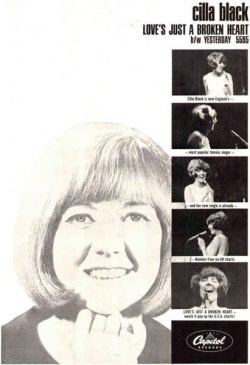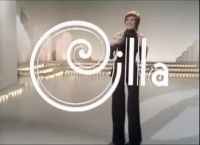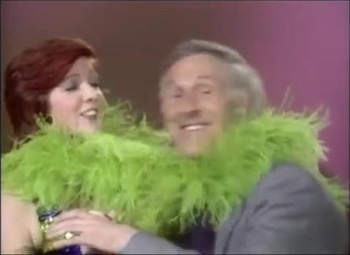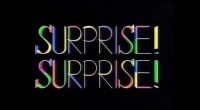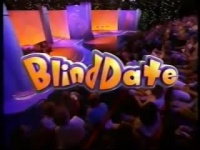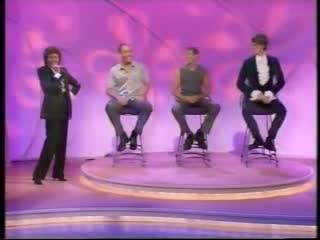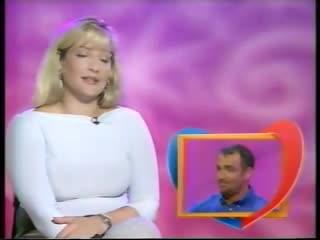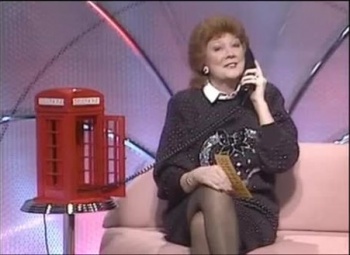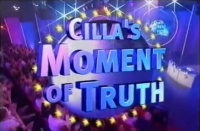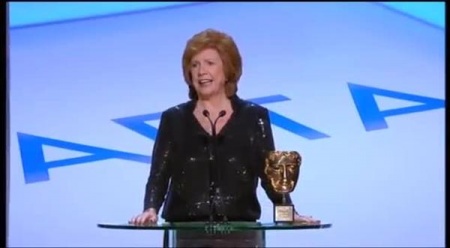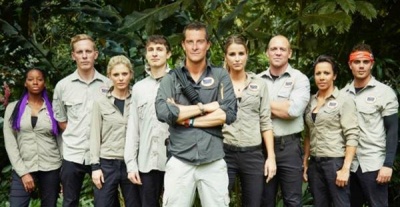Weaver's Week 2015-08-09
Last week | Weaver's Week Index | Next week
We heard last Sunday that Cilla Black had died. She hosted Blind Date and The Moment of Truth, and had a tremendous influence in the history of light entertainment.
Contents |
Cilla Black
Priscilla Maria Veronica White (Cilla Black), singer and entertainer. Born Vauxhall, Liverpool 27 May 1943; married 1969 Bobby Willis (died 1999; three sons, and one daughter deceased); died Estepona, Costa del Sol, Spain 1 August 2015.
Priscilla was born into a poor Catholic family. Rather than money, her parents gave names to their three sons and one daughter. They grew up above a barber's shop on the Scotland Road. After leaving school in 1958, Cilla took time as a waitress in a coffee bar, and lunchtime shifts in the cloakroom at the Cavern Club.
She was already a performer, leaping on stage at the Locarno dance hall to sing swing numbers. Her regular backing band, Rory Storm And The Hurricanes, included Ringo Starr on drums. "Swinging Cilla" got her stage name by accident – the Mersey Beat publication incorrectly recorded her surname, turning White into Black.
Cilla Black auditioned for Brian Epstein in 1962, backed by the Beatles, and was eventually added to his short roster of impressive hitmakers from Liverpool. Cilla's first single release, "Love of the loved", was a Lennon and McCartney number that her backing band never recorded. It helped to cement the songwriters' reputation, words and chords that mean something. Her breakthrough hit came in 1964, a cover version of "Anyone who had a heart". Dionne Warwick recorded the original, but many argue that Cilla's is the definitive rendition. It was the first of two number one smashes, "You're my world" followed later in 1964. She finished the year as runner-up in the New Musical Express popularity poll for Outstanding Female Singer.
Growing up in the poor end of Liverpool meant that Cilla had roots, she had an instinct for the ordinary person who couldn't fulfil their dreams. She'd seen it in her parents – mother had a powerful soprano voice, father was always dressed in a well-fitting suit, neither got anywhere because social mobility hadn't yet been imported. Cilla embodied the new democracy of pop music – anyone could aspire to be a pop star. Even a girl from above the barber's on the Scotland Road, the girl who dyes her hair red with a rinse from Woolies.
Cilla had two further hit singles of note, a rendition of "The long and winding road"acclaimed by Paul McCartney as the best, and an interpretation of "You've lost that lovin' feeling" that bears comparison to the Righteous Brothers' original. She never conquered America: homesickness and a pushback against the "British invasion" limited her opportunities. Billboard magazine said she was "long on poise, off-beat humor and vocal ability, but short on material."
The standard career move for women pop stars had been the cabaret circuit – Cilla had spent eight months at the London Palladium in 1964. By the mid-60s, television proved more appealing than cabaret, and Cilla was one of many stars to have a regular light entertainment show on BBC1. Here's a sample billing from 1968:
BBC1, 8pm CILLA
- A weekly show starring CILLA BLACK
- Among her guests, RINGO STARR
- Special guest star, SPIKE MILLIGAN and featured in her 'Person-to-Person' interview
- HARRY SECOMBE and members of The Four Musketeers cast now appearing at the Theatre Royal, Drury Lane
- The Irving Davies Dancers
- Choreography by Irving Davies The Ladybirds
- Musical director, Harry Rabinowitz
- Musical associate, Ronnie Hazlehurst
- Script by Ronnie Taylor
- Design by Kenneth Sharp
- Produced by Michael Hurll
"Cilla" was light entertainment for the masses – her old backing drummer, two Goons, some less famous dancers, with a couple of legends in the credits. And that's just one episode. Cilla had been passed over for the Eurovision Song Contest in 1968 – the BBC reckoned a solo woman can't win it twice, so they sent Cliff Richard and Spain sent Massiel. That turned out well.
Cilla won The Sun television award for Most Popular Female Television Personality each year between 1971 and 1974; the BBC suggested 14.25 million people saw her variety show. The Cilla show ran until 1976, and innovated by sending a reporter into the house of an "unsuspecting" victim, someone who just happened to have a telegenic talent. All scripted, of course.
Cilla always had an acting bug, she'd appeared in a few movies in the late 1960s, and took a brief diversion into sitcoms. Cilla's Comedy Six and Cilla's World of Comedy ran on ATV in 1975-6; critics acclaimed the writing, the public paid little notice. The viewing public tolerated her acting, they wanted to see the genuine woman. She responded with a special for Thames in May 1978; further productions planned for that year and in 1979 were lost to strike action.
So 1979 would be spent doing the summer season in Bournemouth. She kept up a handful of television appearances, popping up on traditional variety shows like Seaside Special and London Nights Out. Cilla made a determined effort to get back into entertainment in 1983, she did Punchlines and The Keith Harris Show and Blankety Blank. All of this was to promote her Greatest Hits album.
Part of the promotional tour was https://www.youtube.com/watch?v=qZusUyhQls0 Terry Wogan's talk show one Saturday night in January 1983. She brought the house down, tonight Cilla was a one-woman army going up Fame Mountain, and she wasn't going to stop until she'd scaled it.
That brought her to the attention of Alan Boyd, the head of entertainment at LWT, who snapped her up for a show at Christmas. And then she took LWT's Surprise Surprise, again produced by Michael Hurll, which began as a cross between two other series. Many of the production staff had come from Game For a Laugh; they'd brought items such as talking to a blind man who wanted to do a parachute jump, or asking people to play a tune on the potatoes in the shopping centre. Making children's wishes come true was the hallmark of Jim'll Fix It on the other side; Cilla made dreams happen for adults and families.
An occasional item on the first series of Surprise Surprise would prove to be its key ingredient – the family reunion. By the third series, Surprise Surprise had its format worked out. Every item ended with a "surprise!" reaction shot, the moment when the dramatic tension is resolved, when the scales fall from the punter's eyes and they see what we see. The "Oh my, it's a Cillagram!" moment. The "Corks, it's my long-lost relative!" moment. Tears of happiness; if parting is such sweet sorrow, reunion is delicious celebration.
The show was gently heart-warming, upbeat, unexpected things that made no-one feel bad. Gordon Burns popped up to make appeals for long-lost relatives, there were a couple of light entertainment performances, and reports from folk like Bob Carolgees and Tessa Sanderson. Surprise Surprise ran in a regular series from 1984 to 1997, and continued in specials until 2001.
By then, Cilla was established on Blind Date. "A young man or woman chooses a partner of the opposite sex by questioning three candidates screened from view," explained TV Times for the first show. Before transmission, the IBA was concerned that the show might be too smutty for primetime, but were reassured that Cilla could play the role of an ingènue. Cilla had spent twenty years being anything but sexual. She was respectable, reliable, trustworthy, solid, formidable. Cilla sold us her personality, not her body. We could believe that the double meanings would go over her head.
We can also believe that the IBA and LWT didn't want the series hosted by a gay man, or someone appearing to be a gay man. "If you don't like him, I do" from a male presenter would confuse a heterosexual audience. Cilla was married, very happily married, and would remain married until Bobby's death in 1999.
Viewers could, if they liked, pick which of the three potential dates they'd most like to snog, marry, or avoid. Earlier people shows – The Generation Game, even Surprise Surprise – had tended to use the public as fodder for daft ideas. Whoever does a square dance with Larry Grayson is going to look silly. Whoever plays a tune on the potatoes will look foolish. Blind Date allowed the public to bring in some of their own personality. She does impressions. He is dressed as Austin Powers. Each contender shows their personality, is judged for their personality.
We the audience could form judgements on the contenders. Blind Date was an unusual opportunity for the Great British Public to sit in judgement on itself. That man dressed as Austin Powers: is he acting, or is he really that much of a wally? The impressions: a mask, or just inept? In Blind Date, we have the seeds of the media professional, the sort of person who would use Big Brother as a means to advance their own career.
The banter between "blinders" and "date" is obviously staged and scripted. There's more ham acting in this programme than in Pigsty Theatre's production of Hamlet. But this is what the public wanted: a ritual question, a risqué response, an innuendo that flew over Cilla's head. And the ritual climax to each segment: "you've turned down bachelor number one."
But this was just the beginning of the show for the couple. After picking their date – it could be a day in a safari park, it could be a cruise to Cuba – the pair would return. We'd see footage from their time together, edited into a punchy package. And then the confessional, each person saying exactly what they thought about the other. Punches were not pulled: emotions were laid before the camera. We saw the reactions in a double-shot – one person talking in the main frame, the other person's reaction set into the frame. Every reaction shot was hit, none were missed.
Blind Date was always brash, it lived in the world of bright colours and simple decisions. To choose, to date, to see each other again, perhaps to marry (as two couples did). It fitted well with the tabloid press, who would dig into the background of contestants. A headline such as "Blind Date Rat Hasn't Even Sent Christmas Card To His Baby Girl" was tragic for the people involved, but of interest to the many readers who watched. Some would remember the couple; some would have had doubts about the couple, thinking "she can do better than him".
As Blind Date grew older, producers threw new ideas at it. Few worked, and the "ditch or date" idea from 2002 completely undermined the show's premise. How did that work? After the banter, the dater dismissed one blinder, and picked another as her preferred date. Friends and family in the audience would then advise whether to "date" that blinder, or to "ditch" him for the last bachelor, still hiding behind the screen.
Blind Date was no longer about positive choice, but about rejection. The show's heart had gone. Cilla announced on a live edition that she was leaving the programme, and it petered out afterwards. Attempts to find a new host came to nothing, and the show hasn't been revived. Yet. Only a matter of time.
Alan Boyd said this week how Cilla would hit the marks every time. Come down the steps, wheel left, find camera 2, deliver piece, wink at camera 3. You can't rehearse Blind Date, but you can plot it, prepare for anything to happen. Laurie Holloway recalls the official lyric to the theme song: "Blind date, blind date – da da da da da da!" Genius. Over in the States, Cilla directly inspired Elaine Joyce's engagement on The All New Dating Game in 1986. Billed at the time as the first woman to host a game show, Elaine lasted a year before being replaced by a bloke.
After Surprise Surprise ended, LWT agreed to make Cilla's Moment of Truth. In this family show, adults were given a week to master a new skill. These were spectacularly pointless endeavours – build a tower of sugarlumps, or memorise a list of countries and their capitals. The emphasis was as much on the prize as the challenge. We would see a video diary, the preparation they've done gets boiled down into a few minutes.
And then, it's the titular Moment of Truth. There's just one chance to pass the challenge. Cilla explains the rules for the challenge, and what's required to win. So we might have five members of an ice hockey team identifying wine by smell and look and taste. All answers must be correct to win the prize. And Cilla will, of course, pad out the reveal for as long as is possible. Succeed, and they'll win a major prize for the family or the group. Fail, and they'll go away with a smaller prize, because Cilla believed that children should get something for their time in the studio.
Moment of Truth ran for four years, 1998-2001, but never really caught the public's imagination. Some have suggested that it only ran as long as it did because it wasn't the done thing to axe a Cilla show. She made 'Cilla's Sing With a Star' (October 2002) – singers performing their favourite song, only to be joined by their favourite performer. Russell Watson, Westlife, or Ronan Keating. It could only work as a one-off.
After Blind Date was put out of its misery, Cilla mostly enjoyed her retirement. She made a few appearances – on Soapstar Superstar (2006) she was an example of how to combine singing and showbiz, guest host on Loose Women, and she was the subject of tribute programme The One and Only Cilla Black in 2013, repeated this week as a tribute. It included clips of Cilla's special BAFTA award from 2014.
What did Cilla teach us? To remain ordinary: her image was that of the girl next door. Then she became the friendly neighbour, later the sweetheart granny of your street. Cilla also taught us to embrace getting old.
And she taught us to work hard: she was the consummate showbiz professional. Every eventuality was considered, every possibility thought about. It meant she didn't suffer fools gladly, and it meant she stood by her values and her friends when they needed her.
Above all, Cilla was consistent. She would always bring a little happiness into a lot of people's lives. That's how we'll remember her.
This Week and Next
The year's least surprising news: Prized Apart won't be coming back. We were struck by a suggestion about the original format. It would have been a series of standalone challenges. One half of the partnership would learn a skill (such as how to throw circus knives), the other half would learn a matching skill (how to have circus knives thrown at you). They'd be brought together in the studio, and given one chance to demonstrate their new skill. It's analogous to The Moment of Truth from many years earlier.
From a land down under, Trevor Agnew casts an eye on Tipping Point. Why has this simple show become the compelling breakout quiz of the decade?
To University Challenge, where Manchester The Team Everyone Wants To Beat took on York The Team Everyone Wants To Duck. Manchester were represented by James Haughton, Osnat Katz, Graham Abbott, Jacob Roberts; York by Barto Joly de Lotbiniere, Sam Smith, David Landon Cole, Joseph McLoughlin. York got the first starter, retained the lead, ran away in the second half, and won by 265-90.
This week's edition will be remembered for the fact that Manchester The Team Everyone Wants To Beat were beaten. And beaten heavily. And beaten by the better team – York were 29/39 on bonuses, a stellar rate at any point in the series. With this being heat four, Manchester are still in the running for a repêchage slot, but we don't expect to see them again.
And, if it's any consolation, the Manchester foursome did score half as much again as a team of eleven representing the whole of Australia.
To Only Connect, where the Collectors (Daniel Nazarian, Anna Kirby-Hall, Elliot Costi) took on the Railwaymen (David Smith, Sree Kanthamneni, Bob Thompson). The Railwaymen won it, 23-10. It was another one-sided match, the Railwaymen took three on their first two connections, spotting "white suits" from Elvis and Paul Sinha, and then getting charades clues. We were interested to see parliamentary recalls recalled, did we have this about four years ago? And why does no-one know Bear Grylls?
Hive Minds episode 4 pitted Misinformed (Camo, Scott, Mick) against Mavericks (Dee, Michael, Alan). Mavericks won it by 18-14. We enjoyed the false leads on the planets hive, the most BBC4 question was on Tribes of Roman Britain, and both sides fell for errors in the Superhive.
Kick-off weekend in the Mastermind season. As always, they've selected a storming game to start with – all four contenders scored 11 or more on specialist subjects. Dave Barker won the programme, taking Marvel Comics 1961-80. He answered with confidence and aggression, reaching 26 points and never passing.
Beryl Freedman was the runner-up – a score of 25 points and 3 passes is likely to keep her in contention for the high-scoring losers' slots. A shame that John Humphrys still talks over the final bell, and then refuses to repeat the question the contender couldn't hear. Shut up, Humpo.
The original edition of the Week was unable to source BARB ratings in the week to 26 July. For the record, here they are.
- Partners in Crime arrived on BBC1 on Sunday night, the drama based on Agatha Christie was the most-seen show, with 7.95m viewers. The Celebrity Masterchef final was the top game show, with 6.15m.
- Five-Star Family Reunion debuted with 3.5m, and Dragons' Den on BBC2 outscored ITV's only hit game show, The Chase on 2.62m.
- A week of reschedules on BBC2 - Monday's Pointless was shifted over, with 1.7m following, and 1.15m sticking to sample Two Tribes. University Challenge was delayed and suffered a Not Wales figure of 2.5m, Only Connect had 2.3m. Hair got shifted back a full day, 1.05m saw the late episode.
- No such confusion for Catsdown on Channel 4, 1.65m there.
- Top game on the digital channels was Hell's Kitchen (US) on ITV2, seen by 380,000. Compare this figure to the 1.19m who saw the Tour de France finish on ITV4.
There's some disability awareness on The Totally Senseless Game Show (BBC3, Tue). A Question of Sport (BBC1, Wed) resumes with an Ashes special. Billed for half-an-hour, it'll be over in five minutes. ITV's documentary department has another cracker, The Saturday Night Story (ITV, Sat) recalls the best bits of the best night of the week. The first of two parts has hidden cameras, Gladiators, Strictly, and Game for a Laugh.
Photo credits: Capitol Records, BBC, LWT, BAFTA, Bear Grylls Ventures / Electus / betty. Video courtesies: Adam Beckwith, Shaun McManus
To have Weaver's Week emailed to you on publication day, receive our exclusive TV roundup of the game shows in the week ahead, and chat to other ukgameshows.com readers, sign up to our Yahoo! Group.

